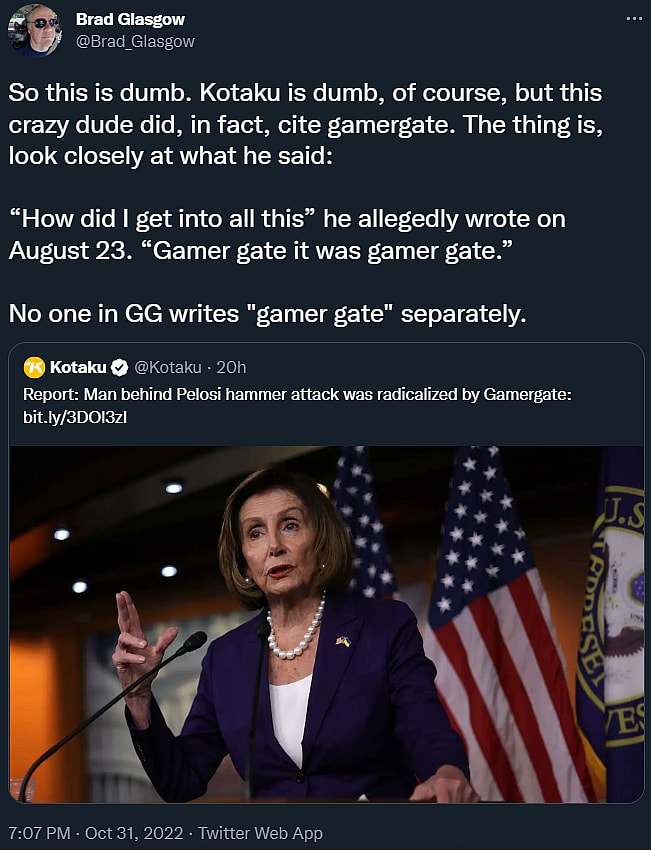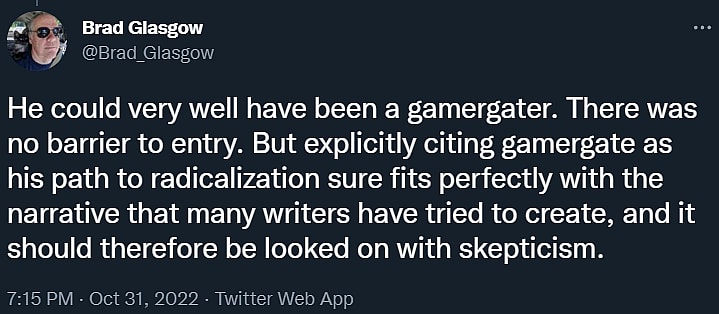Video Game News Outlets Claim Hammer-Wielding Suspect In Nancy Pelosi Home Invasion Was “Radicalized” By Gamergate

Two major video game news outlets have attempted to take a brief mention of Gamergate by the hammer-wielding man who recently attacked Nancy Pelosi’s home as evidence that the suspect was “radicalized” by the eight-year old controversy.

As per current media reports, an individual by the name of David DePape broke into the Pelosi home on the morning of October 28th seeking to have words with the House Speaker herself.
Wielding a two hammers, rubber and cloth gloves, zip-ties, rolls of tape, a rope, and a journal, DePape allegedly sought to interrogate Pelosi on an as-of-yet-specified issue. However, upon entry into the home, DePape discovered not Nancy, but instead her husband Paul.

Waking the man, DePape asked Paul where he could find Nancy. Eventually finessing his way into getting DePape to allow him to use the bathroom, Paul proceeded to call 911.
Upon the arrival of the authorities, DePape is said to have begun attacking DePape with one of his hammers, resulting in a brief scuffle between the two.

However, law enforcement eventually detained DePape, who upon his arrest trevealed to officers that he had planned on “breaking [Nancy’s] kneecaps” if she did not satisfactorily answer his questioning.
As of writing, DePape has been charged with breaking and entering, assault, and attempted kidnapping. Further, authorities are treating it as a “politically motivated” crime, due not only to DePape’s alleged comments during the altercation, but also his own personal blog posts.

Though currently offline, archives of DePape’s blog reveal his rambling thoughts on a number of subjects ranging from the paranormal to serious political issues.
According to his posts, on one end, DePape was seemingly fascinated with such benign possiblities as the existence of aliens, time travel, and even Atlantis.

On the other end, however, the suspect also offered his opinion on a number of more serious topics, such as voter fraud, immigration, communism, climate change, and even the rise of misandry.
DePape also appears to have supported a number of controversial conspiracy theories including PizzaGate, Q Anon, and the idea that the 1969 Apollo moon landing was faked.
Further, he also espoused criticism towards sexual ‘grooming‘ in public schools, skepticism towards the alleged spike protein found in COVID-19 vaccines, and anger at the mainstream media’s spreading of “propaganda” and “disinformation.”

However, amongst DePape’s ‘shotgun spread’ of criticisms and opinions, one particular post stood out to the mainstream gaming media.
As screenshotted by disinformation researcher Erin Gallagher, the post – aptly titled “Gamer Gate” – opens with the self-declaration by DePape that, “How did I get into all this? Gamer gate. It was gamer gate.”

Describing the affair as “a consumer lead revolt against communism”, DePape explained that he “came into” GamerGate thanks to “random videos from some random channels”.
“This led me to channels discussing the topic of Anita Snarkesian [sic],” he continued. “They would talk about her like she is the most toxic s–t on the internet.”

“I had actually seen a couple of her videos it was kinda what ever,” the suspect continued. “However video after video was talking about her like she was just such a toxic s–t.”
“I went back and forth on this issue,” he recalled. “I would listen to the arguments made by one side. Then go and see what the other sides counter arguments were.”

“Back and forth, back and forth,” he said. “Until one side’s arguments fell apart under the weight of their own lies.”
Specifically, noted DePape, the lie that broke the camel’s back was the claim by anti-Gamergaters that “the ONLY people who are opposed to their agenda of pushing communist propaganda into gaming are White Christian Males.”
“They were constantly HIDING behind women and minorities to PUSH their woke communism into gaming ALL while BLAMING Straight White Males,” he explained. “Straight white males are NOT the only people who play games and disagree with their communist agenda.”

Notably, Gallagher was unable to grab a full archive of DePape’s supposed blog before it was taken down.
As such, the full scope of this particular rambling may never be known – however, this didn’t stop the video game news media from charging headfirst into blaming DePape’s attack on his affinity for Gamergate.

First up was Kotaku, whose October 21st report on the subject – headlined “Man Behind Pelosi Hammer Attack Was Radicalized By Gamergate” – claimed that “Gamergate was a hate movement that started in 2014, but still exists in various forms today.”
According to writer Sisi Jiang, despite the continued fear-mongering surrounding Gamergaters (her article included), “these culture warriors lost the battle”.

She would also offer herself an ‘out’ for this contradictory argument by vaguely writing off their simultaneous failure-slash-continued-threat as resulting from “people who were radicalized through the movement [going on] to support other extremist causes.”
“The attack on Nancy Pelosi’s residence is not an anomaly, but part of a longer pattern in how Gamergaters use violence to intimidate those they disagree with politically,” Jiang concluded.

Kotaku’s screed would be followed the next day by a similarly-themed opinion piece from Gamesindustry.biz managing editor Brendan Sinclair, who believed that “Gamergate was a test and the industry failed”.
“I’m not saying Gamergate created the geopolitical hellscape we find ourselves in,” wrote Sinclair. “Our society is steeped in misogyny and racism that it clearly has no appetite for confronting, and that sad fact goes back a lot further than 2014. ”

He continued, “I also think desperate people can be made to do and think unfathomable things, and decades of society cutting away safety nets and ignoring inequality have exacerbated an already dire surplus of desperate people.”
“Gamergate was a test for how much pushback a decentralized hate movement would receive when it wore a disguise as convincing as two children in a trenchcoat with a pair of Groucho Marx glasses. And this industry failed that test spectacularly,” Sinclair declared.
“I don’t know if a more full-throated identification and condemnation of Gamergate and its motives would have meaningfully changed world events of the last few years, just like I don’t know if I’ll ever forgive the people involved in these decisions for rolling over and letting a hate campaign speak for the games industry for months.”

“I do know that the tactics of Gamergate were proven effective because of whatever mixture of apathy, bigotry, and cowardice guided gaming’s collective response to it eight years ago,” he eventually lamented. ”
I know that the industry’s silence in the face of those tactics did nothing to prevent people like DePape being lost to a world of harmful fabrications, and I know there are an untold number of people out there just like DePape for whom Gamergate was the beginning of a journey that ends in some pretty dark places.”

“And above all, I know that the industry had an opportunity to back up years of rhetoric about what a positive force in the world gaming can be, about what a welcoming and inclusive space this is for everyone,” Sinclair concluded. “It had that opportunity, and with few exceptions, it ran and hid from it as fast as it possibly could.”
Unsurprisingly, Jiang and Sinclair s disingenuous portrayal of Gamergate – which, in reality, was in fact a campaign to spread awareness of ethical issues within the realm of video game journalism – as well as their attempts to blame the latest headline news to their pet scapegoat resulted in respective waves of backlash against the outlets.

Notably, among this sea of critics was independent video game journalist and GamerGate researcher Brad Glasgow, who bluntly replied to Kotaku’s article, “So this is dumb.”
Kotaku is dumb, of course, but this crazy dude did, in fact, cite gamergate,” he explained. “The thing is, look closely at what he said: ‘How did I get into all this’ he allegedly wrote on August 23.”
“‘Gamer gate it was gamer gate,'” Glasgow pointed out. “No one in GG writes ‘gamer gate’ separately.”

With this in mind, he then proposed, “It seems likely to me that he’s well aware of recent (dishonest) discussion about radicalization and that multiple articles and groups have blamed radicalization on gamergate.”

“He could very well have been a gamergater,” he ultimately explained. “But explicitly citing gamergate as his path to radicalization sure fits perfectly with the narrative that many writers have tried to create, and it should therefore be looked on with skepticism.”

